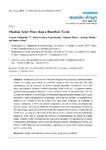Okadaic Acid: More than a Diarrheic Toxin

Ver/
Use este enlace para citar
http://hdl.handle.net/2183/19149Coleccións
- Investigación (FEDU) [939]
Metadatos
Mostrar o rexistro completo do ítemTítulo
Okadaic Acid: More than a Diarrheic ToxinAutor(es)
Data
2013Cita bibliográfica
Marine Drugs 2013, Vol. 11, Pages 4328-4349
Resumo
Okadaic acid (OA) is one of the most frequent and worldwide distributed marine toxins. It is easily accumulated by shellfish, mainly bivalve mollusks and fish, and, subsequently, can be consumed by humans causing alimentary intoxications. OA is the main representative diarrheic shellfish poisoning (DSP) toxin and its ingestion induces gastrointestinal symptoms, although it is not considered lethal. At the molecular level, OA is a specific inhibitor of several types of serine/threonine protein phosphatases and a tumor promoter in animal carcinogenesis experiments. In the last few decades, the potential toxic effects of OA, beyond its role as a DSP toxin, have been investigated in a number of studies. Alterations in DNA and cellular components, as well as effects on immune and nervous system, and even on embryonic development, have been increasingly reported. In this manuscript, results from all these studies are compiled and reviewed to clarify the role of this toxin not only as a DSP inductor but also as cause of alterations at the cellular and molecular levels, and to highlight the relevance of biomonitoring its effects on human health. Despite further investigations are required to elucidate OA mechanisms of action, toxicokinetics, and harmful effects, there are enough evidences illustrating its toxicity, not related to DSP induction, and, consequently, supporting a revision of the current regulation on OA levels in food.
Palabras chave
Okadaic acid
Diarrheic toxin
Toxicity
Phosphatase inhibition
Diarrheic toxin
Toxicity
Phosphatase inhibition
Versión do editor
Dereitos
Reconocimiento 3.0
ISSN
1660-3397






